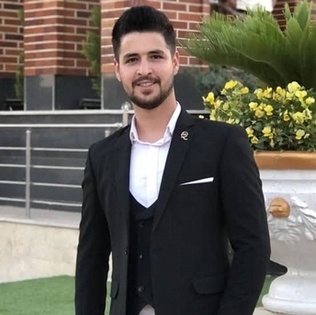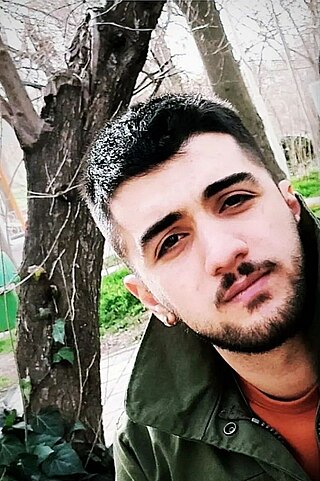Special Clerical Court, or Special Court for Clerics is a special Iranian judicial system for prosecuting crimes, both ordinary and political, committed by Islamic clerics and scholars. The Special Clerical Court can defrock and disbar Islamic jurists, give sentences of imprisonment, corporal punishment, execution, etc. The court functions independently of the regular Iranian judicial framework, with its own security and prison systems, "generally secret and confidential" cases, proceedings and procedures, and is accountable only to the Supreme Leader of Iran,. The most senior Islamic politician to be prosecuted and sentenced to prison since the Iranian Revolution was Abdollah Nouri who was sentenced to five years in prison for political and religious dissent by the court in 1999.

In Islamic law, Ḥirābah is a legal category that comprises highway robbery, rape, and terrorism. Ḥirābah means piracy or unlawful warfare. It comes from the triliteral root ḥrb, which means “to become angry and enraged”. The noun ḥarb means 'war' or 'wars'.
The 2011–2012 protests in Iran were a series of demonstrations in Iran which began on 14 February 2011, called "The Day of Rage". The protests followed the 2009–2010 Iranian election protests and were influenced by other concurrent protests in the region.
Rouhollah Dadashi was an Iranian powerlifter, bodybuilder and strongman, competing for Iran in international strongman competitions.

Abolqasem Salavati is an Iranian judge and former head of the 15th branch of the Islamic Revolutionary Court in Tehran, Iran. In recent years, he had been the judge of numerous controversial cases. He has been sanctioned by the United States and the European Union.
The Greater Tehran Central Penitentiary is a prison approximately 32 km (20 mi) south of Tehran. Sometimes called Tehran Central Prison, it is a large prison, also known as "فشافویه ", "Fashafuyeh" or "Hasanabad-e Qom Prison". It was built in 2012 in the Hasanabad region south of Tehran, in the deserts of the Tehran to Qom highway.
Several thousand prisoners have been or are being transferred to the Greater Tehran Central Penitentiary from Evin, Gohardasht and Ghezel Hessar prisons.
With an official capacity of 15,000 inmates, the prison is the largest detention facility in the country.
Marjan Davari is an Iranian researcher, translator and writer who has been studying, teaching, translating and researching new age material, philosophical and metaphysical texts for more than 26 years.
Ruhollah Zam was an Iranian activist and journalist. Best known for operating a Telegram channel named 'Amadnews', which he founded in 2015, Zam played a high-profile role in the 2017–2018 Iranian protests, to which he devoted special coverage at the time. In June 2020, an Iran court found him guilty of "corruption on earth" for running a popular anti-government forum, which officials said had incited the 2017–2018 Iranian protests. He was sentenced to death by an Iranian court and was executed on 12 December 2020.

The 2018–2019 Iranian general strikesand protests were a series of strikes and protests that took place across Iran from early 2018 until mid-2019 against the country's economic situation, as well as the Iranian government, as part of the wider Iranian Democracy Movement.
Saeed Shirzad, is an Iranian human rights activists who's been on several long hunger strikes. His arrest and hunger strike have been widely reflected on news agencies and the social medias. Saeed was detained on June 8, 2014. He spent more than two months in Evin Prison without being in touch with his family and lawyer. He was finally sentenced to five years in prison in September 2015, after Branch 15 of the Revolutionary Court convicted him of “gathering and colluding to commit crimes against national security.
Haft Tappeh Sugarcane Agro-Industry Co is located in the ancient area of Haft Tappeh and on the remnants of the Elamite civilization. This company is located near the historical city of Susa and Choghaznabil Temple and at a distance of 45 km from Andimeshk road to Ahvaz in Khuzestan province. Residential complexes have been built for employees in this area.
The 2021-2022 Iranian protests erupted on 15 July 2021 to protest the water shortages and crisis, but were quickly met with police violence and brutality. "Bloody Aban", November 2021 saw further protests due to water shortages but various other protests and strikes also took place due to the worsening economic situation. In August 2021, Amnesty International noted that brutal forces have been used by the Security Forces to oppress the protesters.
This is a broad timeline of the ongoing series of protests against the government of Iran, sparked by the death of 22-year-old Mahsa Amini on 16 September 2022. Amini had fallen into a coma after having been detained by the Guidance Patrol, allegedly for wearing an "improper" hijab—in violation of Iran's mandatory hijab law—while visiting Tehran from Saqqez.
Mohsen Shekari was a 22-year-old Iranian man who was executed by the state of Iran after being convicted of injuring a member of Iran's Basij militia and being accused of Moharebeh, an Arabic word translating to "waging war against God".
Death sentences during the Mahsa Amini protests is a list of Iranian citizens sentenced to death or charged with crimes punishable by death in the Islamic Republic of Iran during the Mahsa Amini protests. Following rushed trials that were widely criticized by human rights organizations, the Islamic Republic has executed eight protestors, Mohsen Shekari, Majidreza Rahnavard, Mohammad Mehdi Karami, Seyyed Mohammad Hosseini, Saleh Mirhashemi, Majid Kazemi, Saeed Yaghoobi and Mohammad Ghobadloo. Dozens of protesters have been charged with offenses that are punishable by death in Iran.
Mohammad Boroughani is an Iranian man facing a death sentence for his participation in the Mahsa Amini protests. He was found guilty of Moharebeh, which translates to "Waging War Against God," and was sentenced to death. Boroughani and another death-row inmate, Mohammad Ghobadloo, have emerged as new faces of outrage in Iran in response to the political executions of Mahsa Amini protestors. Hundreds of demonstrators gathered at Karaj's Rajayi-shahr Prison on January 9, 2023, when word spread that Boroughani and Ghobadloo had been sent to solitary confinement before of their scheduled execution. Boroughani's execution was temporarily halted two days later. Boroughani's trial on October 29, 2022, was also notable because it was the first trial directly linked to the Mahsa Amini protests, which drew widespread condemnation from human rights organizations and the international community.

Mohammed Ghobadlou was an Iranian man executed for his participation in the 2022 Mahsa Amini protests. He was charged with murder and moharebeh, which translates to "waging war against God", and was sentenced to death. He was accused of running over Iranian special police units in Parand city with a car, killing Farid Karampour Hassanvand and injuring five of police units.
Hamid Ghareh-Hassanlou was arrested in nationwide protests in Iran after the death of Mahsa Amini. He is a Gonabadi dervish and a medical doctor who specializes in medical imaging. He was charged with killing a Basiji member during the funerals of Hadis Najafi by the Islamic Revolutionary Court in Karaj. His wife, Farzaneh Ghareh-Hassanlou was arrested the same day. They were reportedly beaten during the arrest, and Hamid's ribs were later reported broken.

Mohammad Mehdi Karami was a 21-year-old Iranian-Kurdish man who was executed by the Islamic Republic of Iran for his involvement in the Mahsa Amini protests. He was convicted of Fisad-e-filarz for allegedly being involved in the killing of a Basij militiaman during protests in Karaj commemorating the 40-day anniversary of Hadis Najafi's death. Karami was executed alongside 39-year-old volunteer children's coach Seyyed Mohammad Hosseini, another man who was also convicted of Fisad-e-filarz for his alleged involvement in the same killing. Both Karami and Hosseini asserted their innocence, and human rights organizations have accused Iranian authorities of using "shoddy evidence" to convict them.

Seyyed Mohammad Hosseini was a 39-year-old Iranian man who was executed by Iran's Islamic Republic for his participation in the Mahsa Amini protests. He was also known as Kian Hosseini. He was found guilty of Fisad-e-filarz for his alleged involvement in the murder of a Basij militiaman during demonstrations in Karaj during the 40th-day memorial of Hadis Najafi. Hosseini was hanged with Mohammad Mehdi Karami, a 21-year-old sportsman who was also convicted of Fisad-e-filarz for his alleged role in the same killing. Hosseini maintained his innocence throughout his detention and trial.






